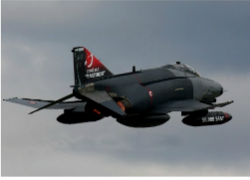On June 22nd, Syrian armed forces shot down a Turkish F-4 Phantom Warplane, which burst into flames and crashed into Syrian territorial waters. Syrian authorities assert that the aircraft entered its airspace at low altitude and high speed, and that its defense forces acted legally in taking it down. “There was no hostile act against Turkey whatsoever. It was just an act of defense for our sovereignty,” said Syrian foreign ministry spokesman Jihad Makdissi.

Turkish authorities, however, are singing a different tune over the downing of its fighter jet, whose two pilots remain missing. Turkey asserts that the plane was shot down over international waters after only very briefly straying into Syrian airspace. While it plans to wait for further details to emerge before deciding on an official response, Turkish President Abdullah Gül has announced that “necessary steps will be taken,” and that “the consequences could be quite serious.”
In the immediate aftermath of the attack, the Turkish government requested an emergency meeting with its NATO allies, pursuant to Article 4 of NATO’s founding Washington Treaty, which allows any NATO ally to request a consultation. NATO Secretary General, Anders Fogh Rasmussen, speaking for the alliance after the meeting, condemned the Syrian attack as “unacceptable.”
U.S. Secretary of State Hillary Clinton was harsher in her criticism, calling Syria’s action an “open and grave violation of international law.”
Others, however, are more skeptical of Turkey’s portrayal of the situation. Some NATO members, including the United States, have privately expressed concerns that the Turkish jet was engaged in more than training exercises, as Turkey claims, and could possibly have been on a spy mission. Turkey has admitted that the plane was equipped with surveillance equipment, but vehemently denies that it was spying. And even the doubters note that regardless of the nature of the Turkish mission, Syria’s response was not proper. “When this happens between neighboring countries, you give a warning and then send up interceptors. You don’t just shoot down the plane,” said one source.
The Syrian attack comes at a time of great general instability in Syria and dissatisfaction with Syrian leader Bashar al-Assad. Turkey in particular has been a harsh critic of Syria’s treatment of its own citizens, and Turkish Prime Minister Recep Tayyip Erdoğan’s personal relationship with Assad is reportedly very cold. With Turkey already an apparent safe haven for rebels intent on overthrowing Assad, the Syrian attack on the Turkish jet will only diminish an already contentious relationship.
Thomas Scott is a rising third year law student at the University of Denver Sturm College of Law and a Senior Staff Editor of The View From Above


